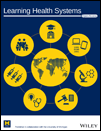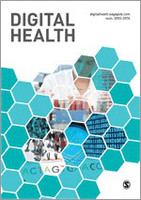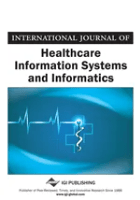
npj Digital Medicine
Scope & Guideline
Transforming Patient Care with Cutting-Edge Research
Introduction
Aims and Scopes
- Artificial Intelligence and Machine Learning in Healthcare:
The journal publishes research on the application of AI and machine learning in various healthcare settings, including diagnostics, treatment planning, and patient monitoring. This includes studies on algorithms designed to predict patient outcomes, improve diagnostic accuracy, and enhance clinical decision-making. - Digital Health Interventions:
Research on digital health interventions, such as mobile health applications and telemedicine, is a core focus. This includes evaluations of their effectiveness in managing chronic diseases, enhancing patient engagement, and improving healthcare delivery. - Health Equity and Access:
The journal emphasizes research that addresses health disparities and promotes equity in healthcare access through digital solutions. Studies often explore how technology can be leveraged to reach underserved populations and improve health outcomes. - Data Privacy and Ethics in Digital Health:
The ethical implications of using digital health technologies and AI in medicine are a significant theme. The journal features articles that discuss data privacy, security, and the ethical considerations of implementing AI in clinical practice. - Wearable Technologies and Remote Monitoring:
Research on wearable devices and their applications in monitoring health metrics and managing diseases is prevalent. This includes studies on how these technologies can provide real-time data for better health management. - Regulatory and Policy Aspects of Digital Health:
The journal also covers the regulatory landscape surrounding digital health technologies, including discussions on policy implications, compliance, and the impact of regulations on innovation in healthcare.
Trending and Emerging
- Integration of AI in Clinical Practice:
There is a significant increase in research focused on integrating AI into clinical workflows, including decision support systems and diagnostic tools. This trend underscores the growing reliance on AI to enhance clinical decision-making. - Remote Patient Monitoring and Telehealth:
The COVID-19 pandemic has accelerated the adoption of telehealth and remote monitoring solutions. Research in this area is trending, with a focus on the effectiveness of these interventions in managing chronic diseases and improving patient outcomes. - Digital Biomarkers and Precision Medicine:
Emerging studies are focusing on the development of digital biomarkers derived from wearable devices and mobile health applications. This trend aims to enhance precision medicine approaches tailored to individual patient needs. - Generative AI and Natural Language Processing:
Research exploring the use of generative AI and natural language processing (NLP) for medical applications is gaining momentum. This includes studies on AI-driven patient communication, documentation, and information extraction. - Health Equity and Social Determinants of Health:
There is a growing emphasis on research that addresses health equity and the social determinants of health, particularly how digital health technologies can be leveraged to improve access and outcomes for marginalized populations. - Ethics and Policy Frameworks for Digital Health:
Emerging themes in ethical considerations and policy frameworks surrounding the use of digital health technologies are increasingly prominent, reflecting the need for responsible innovation in the field.
Declining or Waning
- Traditional Clinical Trials:
There has been a noticeable decline in studies that focus solely on traditional clinical trial methodologies without incorporating digital health innovations. As digital therapeutics and remote monitoring gain traction, traditional trial designs are being overshadowed. - Basic Biomedical Research:
Research that focuses on basic biomedical science without a direct application to digital health or technology integration is less frequently published. The journal is increasingly prioritizing studies that connect technology with clinical applications. - Generalized Health Technology Assessments:
There is a waning interest in broad assessments of health technologies that do not specifically address digital or AI-enabled solutions. The journal is now more focused on specific applications of technology rather than generalized evaluations. - Manual Data Collection Techniques:
Studies relying on traditional, manual data collection methods are becoming less common as the field shifts towards automated, data-driven approaches that leverage digital tools and AI.
Similar Journals

Frontiers in Digital Health
Unlocking the Future of Healthcare with Digital SolutionsFrontiers in Digital Health is an innovative peer-reviewed journal published by FRONTIERS MEDIA SA, focusing on the intersection of digital technology and healthcare. As an Open Access journal since 2020, it aims to democratize knowledge by making cutting-edge research freely available to the global community. The journal covers a wide array of topics within the realms of Biomedical Engineering, Health Informatics, and a variety of Computer Science Applications, ensuring interdisciplinary collaboration and advancements. Recognized for its excellence, it holds prestigious rankings in multiple categories, including Q1 in Biomedical Engineering and Q2 in several related fields according to the 2023 metrics. Set in the heart of Switzerland, the journal fosters a comprehensive approach to enhancing digital health technologies, making it an essential resource for researchers, professionals, and students dedicated to improving health outcomes through innovation.

Lancet Digital Health
Exploring the Intersection of Technology and Patient Care.Lancet Digital Health is an esteemed Open Access journal published by ELSEVIER, dedicated to advancing the interdisciplinary field of digital health. Since its inception in 2019, the journal has rapidly established itself as a leading platform for disseminating high-quality research focusing on the implications of digital technology in healthcare delivery, health informatics, and patient management. Renowned for its rigorous peer-review process and commitment to academic excellence, Lancet Digital Health currently holds prestigious Q1 rankings across multiple categories including Decision Sciences, Health Informatics, and Medicine (miscellaneous) as of 2023. With an impressive impact in its field—ranked #1 in Health Informatics and within the top percentile of related disciplines—this journal offers vital insights into the ongoing transformations within health systems globally. Researchers, healthcare professionals, and students alike will find a wealth of cutting-edge studies, practical applications, and discussions on the future of digital health, fostering an evidence-based dialogue that is essential in today's rapidly evolving medical landscape.

Learning Health Systems
Fostering collaboration for transformative health advancements.Learning Health Systems is a premier open access journal published by WILEY that has been at the forefront of innovation in the fields of Health Informatics, Health Information Management, and Public Health since its inception in 2016. With a dedicated focus on the intersection of clinical practice and health technology, this journal is pivotal for researchers, professionals, and students seeking to advance the knowledge base in these critical areas. The journal enjoys a robust reputation, boasting a Q1 ranking in multiple categories as of 2023, and ranking within the top percentiles in both Medicine and Health Professions across various metrics. Designed to foster collaboration and dissemination of cutting-edge research, Learning Health Systems is committed to bridging gaps between data science and practical health applications while providing an accessible platform for transformative ideas. It invites contributions that challenge existing paradigms and promote innovative solutions that enhance healthcare delivery and patient outcomes.

Intelligent Medicine
Transforming healthcare through innovative AI insights.Intelligent Medicine, published by Elsevier, is a leading open-access journal dedicated to advancing the fields of Artificial Intelligence, Biomedical Engineering, Health Informatics, and related areas within Medicine. Since its inception in 2021, it has quickly established itself among the top tier of academic publications, holding a commendable Q2 ranking in several categories, including a rank of #51 in Health Informatics and #104 in Medicine (Miscellaneous) as of 2023. The journal aims to disseminate innovative research that harnesses AI technologies to improve healthcare outcomes, bridging the gap between cutting-edge technology and medical practice. With its open-access model, Intelligent Medicine ensures broad dissemination of research findings, facilitating collaboration and knowledge sharing among researchers, practitioners, and students globally. Located in Amsterdam, Netherlands, this journal plays a pivotal role in shaping the future of intelligent healthcare solutions, inviting submissions that push the boundaries of conventional medicine through creative and impactful research.

Digital Health
Transforming Health Through Digital Innovation.Digital Health is a pioneering open-access journal published by SAGE Publications Ltd, dedicated to advancing the field of health technology and its intersection with health policy, informatics, and the broader medical landscape. Since its inception in 2015, the journal has rapidly established itself as an essential resource for researchers, professionals, and students, serving as a platform for innovative research that leverages digital tools to improve health outcomes. Currently ranked in the Q2 category across four relevant domains, including Computer Science Applications and Health Informatics, it commands respect within the academic community. With its accessible framework, Digital Health facilitates the dissemination of critical findings and new methodologies that inform policy and practice. The journal’s commitment to open access promotes worldwide access and cooperation, making significant contributions to the evolving landscape of digital health.

International Journal of Healthcare Information Systems and Informatics
Exploring the future of healthcare through technology and informatics.International Journal of Healthcare Information Systems and Informatics is a prestigious academic journal published by IGI Global, focusing on the vital intersection of healthcare and information technology. With an ISSN of 1555-3396 and E-ISSN of 1555-340X, this journal serves as a pivotal platform for researchers, professionals, and students to explore innovative solutions and advancements in healthcare informatics. As of 2023, it holds a commendable Q3 ranking in categories such as Information Systems and Medicine, highlighting its significant contribution to the academic community. Covering a wide range of topics from healthcare data management to the implementation of information systems in clinical settings, the journal aims to foster critical discussions and disseminate impactful research. With a publication history spanning from 2006 to 2024, it continues to play a crucial role in guiding the future of healthcare information systems. Readers can access this journal through traditional subscription methods, ensuring that leading-edge research reaches those most invested in the evolution of healthcare informatics.

Cardiovascular Digital Health Journal
Bridging the Gap Between Technology and Cardiac CareCardiovascular Digital Health Journal is a premier publication dedicated to advancing the field of digital health technologies in cardiovascular care. Published by Elsevier, this journal is a vital resource for researchers, professionals, and students engaged in the exciting intersection of cardiovascular medicine and innovative digital solutions. With an ISSN of 2666-6936, the journal spans from 2020 to 2024 and is categorized in Q2 across prominent fields including Biomedical Engineering, Cardiology and Cardiovascular Medicine, and Critical Care and Intensive Care Medicine, reflecting its influential position in the academic community. Although currently not an open-access journal, it offers access through institutional subscriptions, enabling a broad reach for cutting-edge research. The Cardiovascular Digital Health Journal not only strives to disseminate high-quality studies but also aims to foster collaborative insights that propel the integration of digital health in cardiovascular practice, addressing the critical needs of health systems worldwide.

Health Information Science and Systems
Enhancing health outcomes through informed research.Health Information Science and Systems, published by Springer, stands as a pivotal academic journal advancing the field of health informatics and information science. With its ISSN 2047-2501 and E-ISSN 2047-2501, this open-access journal aims to disseminate cutting-edge research and innovations that bridge the gap between healthcare and information technology. Since its inception in 2013, it has committed to enhancing understanding of health information systems, electronic health records, and data management strategies, impacting both clinical practice and healthcare policy. Researchers, professionals, and students engaged in health informatics will find indispensable insights and studies that pave the way toward improving health outcomes and system efficiencies. The journal provides a global platform for the dissemination of critical analyses and empirical studies up to the year 2024, making it an essential resource for those seeking to stay at the forefront of this rapidly evolving domain.

Journal of Medical Signals & Sensors
Elevating Medical Research with Rigorous Peer ReviewJournal of Medical Signals & Sensors, published by Wolters Kluwer Medknow Publications, is a pioneering platform in the fields of Biomedical Engineering, Computer Science, and Health Informatics, focusing on innovative research and advancements in medical technology. With an Open Access policy since 2012, the journal promotes widespread dissemination of knowledge, aiming to facilitate the sharing of vital insights and developments among researchers, healthcare professionals, and students globally. The journal has achieved commendable rankings in its various categories, including Q3 in Biomedical Engineering and Radiology, underscoring its importance in advancing health technology and informatics. Its commitment to rigorous peer review ensures that published works are of the highest quality, making it a valuable resource for those engaged in cutting-edge medical research. With annual publications planned through 2024, the Journal of Medical Signals & Sensors continues to expand its influence and relevance in a rapidly evolving scientific landscape.

DEUTSCHE MEDIZINISCHE WOCHENSCHRIFT
Empowering healthcare professionals through informed dialogue.DEUTSCHE MEDIZINISCHE WOCHENSCHRIFT, published by GEORG THIEME VERLAG KG, is a prominent journal in the field of general medicine, with a storied history dating back to 1875. With an ISSN of 0012-0472 and an E-ISSN of 1439-4413, this journal serves as a vital resource for medical professionals and researchers seeking to stay informed on the latest developments and research in medicine. As of 2023, it holds a Q4 ranking in the category of Medicine (Miscellaneous) and is positioned within the 40th percentile among its peers in general medicine, highlighting its relevance within the academic community. While not an open-access journal, DEUTSCHE MEDIZINISCHE WOCHENSCHRIFT offers readers access to a diverse range of articles that encompass clinical studies, systematic reviews, and opinion pieces geared towards enhancing medical practice and research. Located in Stuttgart, Germany, the journal continues to contribute to the advancement of medical knowledge and serves as an indispensable tool for scholars and practitioners alike.